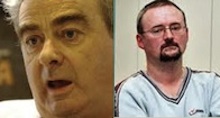
Researchers employed by Boston College to conduct interviews with former IRA members -- the subject of a British government subpoena -- have said they are not surprised at the latest court ruling against their efforts to prevent the interview transcripts falling into the hands of the PSNI.
Former republican prisoner Anthony McIntyre and journalist Ed Moloney conducted confidential interviews from 2001 with a number of prominent IRA veterans, including Brendan ‘the Dark’ Hughes and Dolours Price. The project was believed to be an attempt to catalog the history of the conflict for academic purposes, and to be bound by lifetime confidentiality.
But a furore erupted last month over the decision of Boston College to accept a British subpoena seeking to examine the transcripts and recordings of the interviews for potential ‘evidence’. Among those who are said to be facing investigation over the statements contained in the files is Sinn Fein President Gerry Adams.
On Wednesday, McIntyre and Moloney said they would appeal Judge Young’s decision, along with the rest of the case, to the US Court of Appeals in March when they expect “a much more positive outcome”.
They also welcomed the judge’s remark that the project was a “bona fide academic exercise” of “considerable intellectual merit”.
They said: “This is the answer to those of our critics in Ireland who have labelled the Belfast Project ‘an anti-Adams exercise’. They have not read the interviews, Judge Young has.”
Mr Adams said this week hehas “nothing to fear” from the tapes being handed to the British authorities.
“Que sera sera [whatever will be, will be]”, he said. “I have nothing to fear from any of this..
“The culprits in this all are the people who misled those unfortunates who gave them interviews under totally false pretences.”
Mr Adams said he was concentrating on his job as leader of Sinn Fein and not the ongoing legal case.
“I learnt a long time ago not to worry about things you have no control over.
“What do I have control over? Putting a republican position, an alternative position, acting as the real opposition to this very, very bad government.”
Carrie Twomey, wife of Anthony McIntyre and a US citizen, was present in court. She also travelled to Washington, D.C. and New York, during which she urged the Department of Justice to cease its efforts to secure the archived testimonies.
“I want to bring the human side into the story. This has been lost in the shuffle of papers,” said Ms Twomey.
“This is about people’s lives, directly my family’s life, and those who took part in the project. The justice department, by its actions, is putting the lives of Americans and Irish people in danger,” she said.
The case and its ramifications has stirred significant reaction in the Irish American community.
Representatives of the nation’s three largest and most active Irish-American organizations have protested against the British governments “misuse” of the U.S.-U.K. Mutual Legal Assistance Treaty to “politically interfere in a sovereign nation’s elections and to bully Boston College into providing records intended for historical research and academic inquiry.”
The controversy has also been complicated by the sudden transfer of confidential documents on the North’s arms decommissioning process -- to Boston College.
The archive of documents is the work of the Independent International Commission on Decommissioning (IICD), the arms body which monitored the process of putting arms “beyond use” under the 1998 Good Friday Agreement.
It is believed the PSNI is now seeking to access these files for information on republicans who may have held or transported arms, even as part of the disarming of the Provisional IRA.
Even though, as part of the previous government he originally approved the archive plan, Fianna Fail leader Micheal Martin warned that the move is potentially damaging to the peace process.
![[Irish Republican News]](https://republican-news.org/graphics/title_gifs/rn.gif)
![[Irish Republican News]](https://republican-news.org/graphics/title_gifs/harp.gif)

